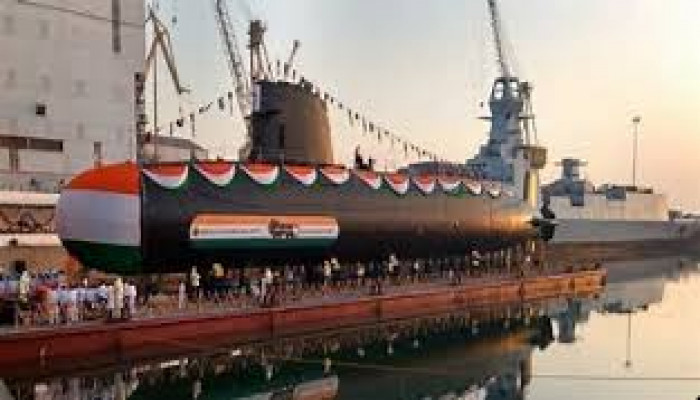Indian Navy's new Scorpene submarines to be manufactured in BEL with French architecture
- In Reports
- 08:54 PM, Jul 29, 2024
- Myind Staff
As the Indian Navy moves forward with acquiring three additional Scorpene-class submarines, Naval Group, the French partner in the project, has announced that the core combat management system for these new submarines will be manufactured in India by Bharat Electronics Limited, with French architectural support.
The Indian Navy is currently negotiating with Mazagon Dockyards to collaborate with the French Naval Group on the construction of these three additional Scorpenes. This agreement follows the delivery of the first six Scorpene submarines, which are expected to be completed by the end of this year.
The new submarines are required to incorporate up to 60 percent indigenous content to meet the specified criteria. Vincent Martinot-Lagarde, Executive Vice President of Naval Group, stated in an email interview that, according to the current plan, the core component of the new submarines—the combat system—will be developed indigenously by Bharat Electronics Limited, based on French design architecture. This represents a significant advancement in achieving higher levels of indigenous content.
Martinot-Lagarde expressed confidence that Mazagon Dockyards Limited (MDL), in collaboration with Naval Group, will meet the target of 60% indigenous content for the overall project. He noted that this will be achieved progressively, balancing delivery schedules and quality standards.
During his visit to India to meet with Indian Navy officials, Martinot-Lagarde described the project as unique, emphasising that it will equip the Navy with the latest technologies in an updated Scorpene design. He highlighted that the new submarines will feature enhanced combat capabilities, superior endurance, and stealth. He acknowledged the challenge posed by the six-year timeline for the first boat but underscored MDL’s extensive experience as a fitting asset for meeting this ambitious goal.
Lagarde mentioned that the Naval Group will contribute some supplies that will be indigenised through partnerships with industrial collaborators via subcontracting. "Several critical systems will be localiaed. We will rely on our existing partners and expand our network, engaging with companies such as L&T, Merlin Hawk, Equans Axima India, VEM, Radiant, and others," Lagarde stated.
He also noted that the remaining supplies will be directly procured by Mazagon Dockyards Limited (MDL). The shipyard is in discussions with its suppliers, both Indian and international, to ensure that these components contribute to the overall indigenous content of the project. The Naval Group official highlighted that a significant portion of this program will benefit the Indian economy, creating thousands of skilled jobs.
"The goal is not only to enhance local industry capabilities but also to ensure that India is prepared for the future maintenance and support of these submarines. This means that MDL, BEL, Naval Group, and other partners will need to build the necessary resources during the construction phase," he explained.
Lagarde commended the Indian Navy's initiative to make its fleet self-reliant and future-ready, emphasising the importance of leveraging domestic resources and expertise. India is working on expanding its submarine fleet to include 21 new conventional submarines and approximately six nuclear-powered submarines (SSNs).
To address shortages and delays in submarine construction, which are crucial for countering the growing threats from China and Pakistan, India has opted to commission three additional Scorpene submarines. This decision, made in 2023 following a Defence Acquisition Council clearance, involves building these submarines at Mazagon Dockyards Limited (MDL) with support from the French naval group.
The Defence Ministry aims to complete the acquisition process within the current fiscal year, targeting at least 60 percent indigenisation for these new submarines. This high level of indigenisation is intended to establish India as a regional hub for submarine construction and to create a foundation for potential future exports.
Image source: MSN







Comments